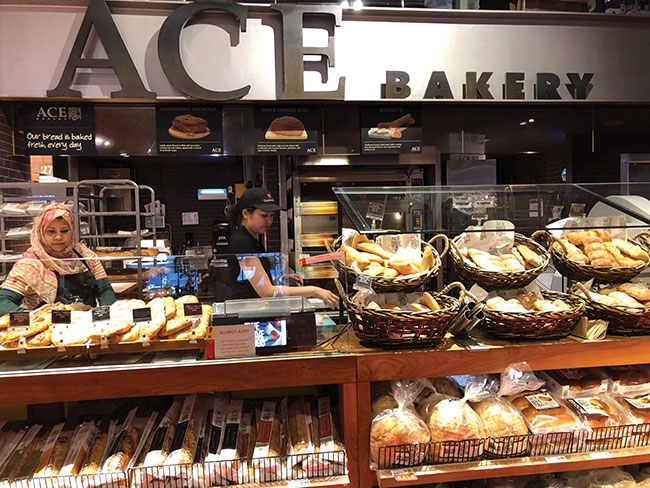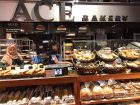
Ace up the sleeve
August 19, 2019
By
Bakers Journal
Master Baker, Marcus Mariathas talks par-baked trends
 Clerks at work in the Ace Bakery inside Loblaws on College Street, Toronto.
Clerks at work in the Ace Bakery inside Loblaws on College Street, Toronto. Master Baker, Marcus Mariathas, is the senior director of product development at Ace Bakery. He’s noticed that the trends that have gained the most ground over the years and is becoming more widespread is the request for natural, clean-label and organic breads. “These are things that people are starting to appreciate more widely…that’s already our foundation. That’s been our concept for about 25 years, now.”
“When I originally started in 1995, I was actually going to University of Toronto, studying business and finance. I needed a job to pay for all my expenses, so I started at Ace as a job. But then, a journey master baker at Ace Bakery showed me how to shape the breads and how to make the starter, and how to make old fashioned, European soft bread. They started teaching me about the aroma, the taste and I got more and more in love with it, and I learned the right way how to develop recipes, how to shape breads.”
Mariathas’ keen mind for business saw how the trends were shifting towards artisanal breads. “I thought baking would be a good business opportunity. These breads are very important to the Canadian and American consumers. It was an opportunity that kind of fell in my lap, and I took it on. The people I work with helped me to gain knowledge.” This bakery experience was put to good use: Mariathas later competed — and won — the American Championship in the World Cup of Baking. That award led to other accolades, as well.
“Because won the championship, we were automatically qualified to participate in the World cup of baking in the Coupe du Monde in 2016, and that was the first time Canada ever qualified at that level at that competition.”
Mariathas familiarity with bread trends and the growing love for sourdough made him the natural choice to talk about par-baked baked artisanal dough. He speaks of how sourdough is starting to develop a cult-like following. Social media channels are blowing up on the subject of sourdough. Some believe that sourdough is easier to digest than other types of bread, and many feel that they have a connection to their community when they buy a loaf made from local wheat. Mariathas believes that “consumers are asking more questions about bread, and that’s a good thing for bakeries.”
“How you treat your flour, how your product is made: Consumers are becoming more aware of sourdough bread. There’s a mania around it: There’s talk of people making their own starter, they’re naming the starter, they’re making bread with that starter. It’s becoming a thing on social media: People want to eat good bread.”
The former business major knows that the key to providing an artisanal bakery experience in a wholesale or retail grocery experience lies in how they freeze their dough and the efforts made to create an artful experience prior to baking. Getting that old fashioned-taste in a modern facility is a trick that the Ace Bakery has long had up its sleeve.
“As a frozen concept, you’re dealing with a different product, so we want to make sure that our breads are mixed to the full stage, and have a finished appearance before it leaves our bakery.” Mariathas knows that timing is of the essence when it comes to dough bakery. “When it comes to this kind of freezing, you have to flash-freeze. We don’t typically freeze stuff for 24 hours or 30 hours. It’s typically half an hour, to the maximum of one hour. That’s the amount of time the product needs to be frozen. It has to come to a certain cold temperature before it gets to the frozen trailers and then distributed to the customers.”
“When you do that, you’re trapping the moisture, everything in the same format it came in out once it’s cooled down, that way you don’t lose moisture, the products won’t go stale, especially the products that we make. We don’t add any chemical leavening, or any chemical ingredients, so we need to make sure that everything is kept intact to give the same experience at the consumer level.”
The master baker knows that there are challenges to flash-freezing. “We need to have controlled temperatures throughout the process. From the mixing to the way you’re proofing, the way you’re fermenting, to the time and the way you’re shaping the breads, when you’re baking the bread: Time and temperature is very, very important for the dough. So, we need to create an environment that’s all controlled and monitored. And you need to freeze it for the right amount of time: If you don’t follow the rules, you’re going to compromise the quality of the product for consumers.”
“Our goal is to provide a boutique bakery quality of bread, but in a scale that we will be able to produce.” He adds that the key advantage to par-baked over freshly baked goods lies in having a routine and a process set in place for larger-scale manufacturing. From issues like environmental controls for fermentation, to maintaining proofing temperatures to keep the breads’ attributes consistent.
“Where I started in a small bakery cafe, there were no temperature controls. In the summer, bread proofed differently. There were variances; the proofing temperatures were not right. There was no control as to how long bread was going to take to proof. Sometimes, two hours, sometimes two hours and thirty minutes; there’s not a lot of control in a lot of small bakeries.” Mariathas adds, the other advantages to par-baked dough are planning and financial. Using par-baked goods not only yields a consistent product, but also saves time and could result in more productivity.
“Whatever other products you make, if you make it consistent, then you can make sure they reach beyond what the consumer wants. One of the key things, when you do a frozen, par baked product like this, you could reach out to anybody in North America with the same results, because all they have to do is put it in the oven for 8 minutes, 10 minutes, and you have a fresh loaf sitting at your table. That’s the beauty of it. You don’t have to go through the routine of making a starter, forming the dough, having a skilled baker: That’s a rare thing. You can’t find a lot of experienced bakers, these days. That’s another issue we face in the industry, these days. Par-baked alleviates staffing issues and still yields a great bread.
“What I’ve noticed so far, in North America, nobody has the amount of starters that we make in-house in order to produce our products. We have nine different starters that we make in house and maintain over time. I’m tempted to say that nobody in North America right now has more starters than we do. Maybe they have two starters, but nobody has nine different starters. That’s the difference for us. “
Mariathas feels that having multiple starters is a “key advantage.” Ace bakery sometimes uses different starters in the same dough in order to develop a unique texture or taste profile. The Master Baker notes that the starters are used to replace the use of artificial flavours or additives to create a flavour. “We do it with our own starters, which is basically flour and water. That’s what creates beauty.”
Print this page


Leave a Reply